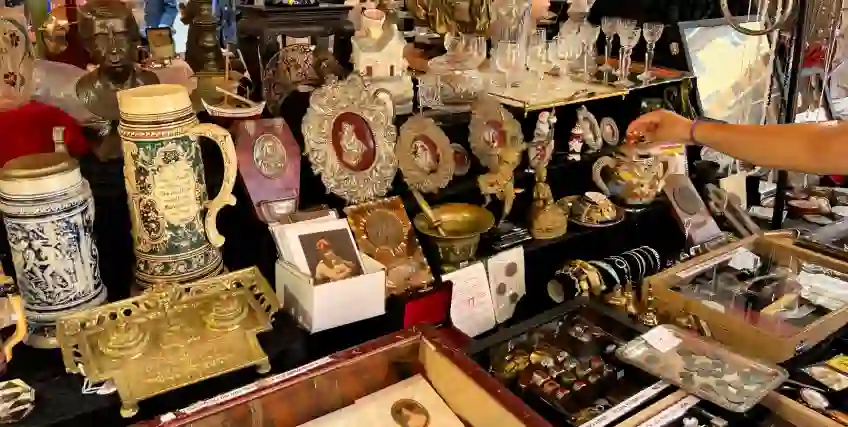Antique Store Business Loans: Financing Options to Preserve and Grow Your Shop
Sep 02, 2025 | Last Updated on: Sep 03, 2025

Owning an antique store can be a lifelong dream for collectible-lovers. It’s an opportunity to be your own boss, while preserving history and serving like-minded customers.
But running a successful antique store requires the same rigor and strategy as any other business. You’ll need cash flow to purchase inventory, to pay staff, and to keep your operation running when things get slow. And you may need to add services like hosting estate sales or auctions.
An antique business loan can fund your growth strategies and keep your business fresh and exciting over the long term.
This article looks at the financing options for antique dealers and shows how an antique business loan can enhance your operations. We’ll also explain how to choose the right financing source and how to prepare for the loan application process.
How to Use an Antique Business Loan
An antique business loan can help grow your business in several ways. With small business loan funding, you can:
- Restock your antique inventory.
- Purchase high-ticket items or rare pieces.
- Renovate or expand your retail space.
- Open another location.
- Launch a marketing campaign to expand your customer base and improve sales.
- Redesign your website to sell online.
- Participate in antique fairs or trade shows.
- Hire temporary help during busy seasons.
- Facilitate delivery services by investing in a delivery truck.
- Add other services like hosting estate sales and auctions, or restoration and repair services.
- Manage cash flow during slower months.
Financing Options for Antique Shop Owners
Antique businesses face unique challenges such as seasonal fluctuations, irregular cash flow, and even inventory challenges. You can go months without finding inventory to replenish your store, yet you need to act fast when the right inventory becomes available.
While traditional bank loans are a potential financing option, you’ll more likely benefit from more flexible forms of financing that are tailored to help your antique business grow.
Here are some financing options to consider:
Business lines of credit
A line of credit is a great antique business loan solution that provides reusable funding that you can use as needed. A line of credit is like a credit card; the lender provides you with a credit amount to use at your discretion, and you don't pay any interest on the loan until you use the line of credit.
You’re only charged interest on the portion of the credit limit you use, and once you repay the credit line used, it’s added back to the total limit.
The great thing about a line of credit is that you can use it for nearly any expense incurred in your antique business, provided you are under your credit limit.
Equipment financing
One of the biggest contributors to the ambiance of your antique store is the layout and design, which is achieved through display cases, lighting, and more.
If you want to provide delivery services for heavier items like vintage furniture, you’ll need a truck or van to transport antiquities from your store to a client’s home or office.
An equipment loan is a kind of antique business loan that can provide the funding you need to purchase these items or other physical assets for your antique store.
One of the benefits of equipment financing is that the items acquired with the loan proceeds act as collateral, which can keep interest rates down.
Term loans
A term loan can be short or long-term and is a popular route for many antique store owners. Term loans can cover a variety of business-related expenditures, ranging from working capital to cover day-to-day operations to hiring staff, marketing campaigns, major renovations, or purchases for your business.
The advantage of term loans is that they usually have fixed-rate financing that is repaid in monthly installments.
SBA loans
SBA loans are backed by the U.S. Small Business Administration and can be ideal for major business expenses, including renovations, commercial real estate purchases, working capital needs, and buying inventory and equipment.
SBA loans have many benefits over other forms of small business loans, including favorable repayment terms, like longer repayment windows and more competitive rates. If you’re an established business with good credit and financials, SBA loans can also offer higher loan amounts.
Revenue-based financing
Revenue-based financing can be a lifesaver for antique store owners who need quick access to funding or those who have less-than-stellar credit. This type of funding allows you to exchange cash for future sales of your antique business, with repayment based on future receivables rather than a fixed timeline.
Revenue-based financing is a great option for a business like an antique store, which often has fluctuating sales and revenue. It’s also easier to qualify for than other types of financing and has lower credit score and time in business requirements.
Identifying the Right Loan for Your Business
The best antique business loan depends on your borrowing needs, goals, and financial situation. It’s important to understand how different loan types work and what they’re best suited for before applying for financing and receiving funding.
The first step is to determine the primary reason you need money. This will help you choose the right loan to match your borrowing purpose and ensure you get the most value from your financing solution.
Considerations When Choosing an Antique Business Loan
The right antique business loan will set you up for success without overextending your financial situation.
Loan term
Short-term antique business loans provide quick access to funds but often come with higher payments. Long-term loans have lower monthly costs but take longer to pay off. You might also end up paying more overall in repaying the loan.
Interest rates and funding time
Lower rates usually come with stricter credit score requirements and business financials. For example, SBA loans from traditional banks usually have low rates, but it may take a while to get funding approved and in your bank account. Online or alternative lenders offer faster funding but may charge higher interest rates.
Repayment flexibility
For easier repayment of your antique business loan, pick a financing option that conforms to the cash flow and sales cycles of your business. Many business owners appreciate the flexibility of revenue-based financing, which gives them breathing room during slower months.
Preparing to Apply for Small Business Loan Funding
Before you apply for an antique business loan, it’s important to get your finances in order. Lenders want to see that your antique shop is a stable, well-managed business. A strong loan application will help you secure a better deal on fees, rates, and the overall structure of the loan.
To start, it’s a good idea to evaluate your business finances. Gather the required documents and take time to understand your credit profile. The more prepared you are, the smoother the application process will be.
Here’s an example of some key documents you will need:
- Business financial statements: These include documents such as profit and loss statements, balance sheets, and cash flow reports.
- Tax returns: Most lenders will want to see at least the last two years of returns, and some will want to see both personal and business tax returns.
- Bank statements: Lenders will evaluate transactions, business deposits, and the typical cash flowing in and out of your antique business. You’ll likely need the most recent three to six months of statements.
- Business plan: An effective business plan will describe how the loan funds will be used, and include plans for growth and inventory acquisition, pricing, and marketing. Conducting market research and doing financial projections will add more substance to your business plan.
- Credit score: It’s helpful to get a copy of your credit report in advance of approaching lenders so you’re aware of where your credit stands. Also, your credit score can limit your choices of lenders and what type of financing you’ll qualify for.
Final Thoughts
Securing an antique business loan can be a turning point for your antique store, allowing you to invest in your business, respond quickly to inventory opportunities, and strengthen your operations.
The right loan for your business enables you to support your business, whether for getting through slow seasonal periods, adding fresh merchandise, improving customers' experiences, or supporting strategies for business growth.
Whatever financing option you choose should be appropriate to the unique nature of your business. By considering your options, putting together a strong application, and partnering with a lender who understands the antique store business, you can position your shop for long-term success and build a thriving business that will stand the test of time.
FAQs About Antique Business Loans
1. What are the minimum credit score requirements for small business loan funding?
It depends on the lender. Traditional banks and lenders usually have higher credit score requirements, while online lenders may be accepting of lower credit scores.
2. How long do I have to be in business to get an antique business loan?
Each lender will have varying requirements for time in business.
3. Can a startup get a business loan for an antique shop?
If you meet the requirements from the lender, then yes. If not, alternative financing options like a business line of credit or a business credit card might be more suitable.
4. Which financing option is best for antique store owners?
The right financing option depends on your needs. The best way to find an answer to this question is to clearly lay out your business needs, and then talk to a few lenders to see what they can offer.
5. What is the easiest antique business loan to get?
Online business loans and equipment financing are easier to get than other types of business loans. They also offer faster funding than traditional loans from banks or credit unions.
Frequent searches leading to this page
Related Articles
Term Loans are made by Itria Ventures LLC or Cross River Bank, Member FDIC. This is not a deposit product. California residents: Itria Ventures LLC is licensed by the Department of Financial Protection and Innovation. Loans are made or arranged pursuant to California Financing Law License # 60DBO-35839




